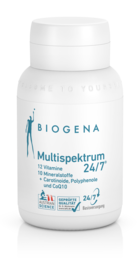Biogena is more than the sum of its parts. Sound specialist knowledge, responsible action, and the will to achieve uncompromising quality are the cornerstones of our mission to enable all people worldwide to enjoy better health. The BIOGENA preparations and their various applications form the basis for this. Learn everything you need to know about micronutrients here.
What are micronutrients?
Micronutrients are substances in our food without which human beings could not survive. Unlike macronutrients (protein, carbohydrates and fat), they do not provide energy. As the tools of our metabolism, they are involved in the basic biological functions of our body. Depending on the area of application, they ensure that we live, grow and “are human” in all our possible manifestations. Since micronutrients cannot be produced by our body or only in insufficient concentrations, these substances must be supplied through food – and regularly and in sufficient quantities.
What micronutrients are there?
Micronutrients primarily include vitamins, minerals and trace elements. In an expanded interpretation of the term micronutrients, other substances are also included – among others proteinogenic amino acids and omega fatty acids, but also vitamin-like substances (= vitaminoids), phytonutrients, enzymes, fibre and special bacterial cultures such as intestinal bacteria.
The difference between macro and micronutrients
Macronutrients (= carbohydrates, protein, fat) are the main components of our food. They are required in large quantities by our body, which uses them as fuel or – after conversion – building materials. In contrast, there are – depending on the definition – around 45 micronutrients that our bodies need in significantly smaller amounts. These substances generally do not provide energy, but are essential for the smooth running of our metabolism and thus for our lives.
What micronutrients does the body need & what are their tasks?
Micronutrients are the cogs of our lives. Whether your nails are growing, your heart beating, you’re having a light-bulb moment or just sneezing, micronutrients are involved in every aspect of these actions.
Test micronutrients in your blood
If you are interested in health, nutrition and/or micronutrients, you will at some stage wonder how well your body is supplied with micronutrients. Special laboratory diagnostic tests, preferably carried out on whole blood, can answer this question in more detail and show you the state of your own micronutrient supply and where you need more.
Micronutrients in your diet – in food & as supplements
Eating isn’t just for enjoyment. Every food we eat also provides an individual, more or less broad range of nutrients. In order to provide the body with micronutrients in the best possible way, the DGE (Deutsche Gesellschaft für Ernährung [German Nutrition Society]) recommends eating a balanced and wholesome diet. Here, diversity should be emphasised, the most natural foods (e.g. fruit, vegetables, grain products, high-quality oils and protein suppliers) should be used and a gentle preparation should be used (e.g. steaming, boiling).
Dosage forms: Liquid, capsules or tablets?
If you search the internet for a micronutrient preparations, you will find a multifaceted kaleidoscope of powders, capsules, tablets, drops, sprays or even more unusual pharmaceutical forms. The great advantage of capsules, as produced at BIOGENA using manufacturing standards, is that unnecessary additives (e.g. binding agents, anti-caking agents, coatings) can be dispensed with. Powder or liquid capsules are characterised by their hygiene and neutral taste thanks to their encapsulation and the possibility of precise dosing and are easier to take on the go. Depending on the micronutrient, liquid pharmaceutical forms as drops or sprays are very expedient and pleasant to use, especially for people who do not like swallowing capsules.
Tips for consuming dietary supplements
The right time
Certain micronutrients must be consumed at an optimal time. As an orientation, please follow the consumption recommendation on the label or the recommendation of your doctor or therapist. This ensures the best possible intake.
EXAMPLES
Iron: This should preferably be consumed on an empty stomach or 1 to 2 hours after a meal.
Zinc: It is best to consume zinc in the evening because tolerance and absorption will be better then.
Plant extracts: Consume immediately before or with a meal.
Omega-3 fatty acids and vitamins A, D, E, and K: Consume with a (fatty) meal.
The right duration of use
Many people hope for an immediate result after consuming a micronutrient preparation. However, a bit of patience is required, especially in the case of a deficiency. This will pay off in the long run.
- In most cases, the depleted reserves must first be replenished. This process usually takes several weeks or months.
- Micronutrients should generally be consumed over a longer period of time.
- Irregular supplementation is less successful than regular and consistent supplementation.
The right dose
A sensible combination and balanced dosage of vitamins, minerals, trace elements, plant extracts, enzymes, and reproductive bacterial cultures is crucial. Please follow the recommendations on the label or the advice of your doctor or therapist.
Biogena is the specialist in product formulation. The dosage and composition of each individual preparation is well documented.
- Combination preparations: several ingredients in one product – can be used for a wide range of applications
- Monopreparations: only one ingredient in the product – used for targeted and individualised micronutrient supply
Synergy effect and complex formation
The optimal interaction of vitamins, minerals, and other micronutrients is the basis for a lasting positive influence on well-being.
EXAMPLES
Vitamin D, magnesium, and vitamin K2: Vitamin D can only be converted into its active form when magnesium is present. Only active vitamin D increases the formation of osteocalcin – an important hormone for bone formation – which is then converted by vitamin K2 so that it can bind calcium in the bone.
Iron: The absorption of iron is significantly improved in combination with vitamin C. Calcium and magnesium can impair iron absorption.
Manufacture of food supplements & quality differences
Not all food supplements are the same. They can vary greatly in quality due to the choice of raw materials and the manufacturing process. BIOGENA stands for the highest quality and transparency along the entire value chain with a commitment to the site in Austria. But what makes our products so special?
Only active substances, no additives
Food supplements can be manufactured according to various procedures. At BIOGENA, we produce in semi-automatic manufacturing according to the pure substance principle. This is more complex, but allows us to avoid unnecessary excipients – artificial colours, flavour enhancers, coatings and separating agents – during production, which would be required in a fully automatic process and are often found in a higher proportion in market-standard products than the actual active substances. We manufacture our capsules with precision, the raw materials of which are selected strictly according to quality and purity criteria, sustainability and scientific documentation. They come from certified suppliers from all over the world and are available in highly bioavailable compounds. Where possible, we pay attention to the absence of carrier materials when selecting raw materials. Where this is not possible, we use natural food ingredients such as maltodextrin, cellulose powder or calcium carbonate. The full declaration of all the ingredients is just part and parcel of what we do.
Production & logistics in your own hands
We produce our products ourselves in Austria and therefore have 100% control over all components. In our production plant, BIOGENA Good Health World, we produce in clean rooms, which, together with their machines, are carefully dusted after each production run. This ensures that a very pure room is available again for the next production. Our hygiene production is subject to strict statutory hygiene regulations, which we have voluntarily expanded significantly. Every employee wears his/her own production clothing and shoes and after thorough hand washing also puts on an astro hood with mouth protection. It is only after the subsequent shoe cleaning and hand disinfection that the work takes place. In addition, several cameras & weighing systems ensure exact control and safety in the filling process.
Through our own production and our own logistics centre, we are fast, flexible and reliable. We deliver 95% of all orders the next day.
Tested quality – voluntary & self-evident for us
We voluntarily have each production batch checked in a laboratory. Although this is not required by law, it is particularly important for us in order to have our high quality permanently checked and confirmed. For years, we have been working with the German LEFO Institute, an independent laboratory of experts, to check the products for various parameters such as impurities, pesticides, heavy metals, etc. and to ensure compliance with all food regulations. Test and quality seals on each product make this visible to consumers.
Sustainability always in focus
Environmental and climate protection is a major concern for us, because “there’s no planet B”. We therefore rely on sustainable, innovative solutions with energy efficiency. For example, our capsules are filled into ecological cans made of renewable raw material from an Austrian manufacturer. These BIOGENA eco-cans use Green PE from a by-product of sugar cane processing and thus offer future-proof packaging material for the valuable capsules. In addition, we rely on renewable energy – specifically on the sun with over 500 solar panels in operation and 450 others planned. Moreover, we have implemented many other measures and creative ideas such as planting trees, a vegan/vegetarian kitchen line, electric cars and more, in order to become “double climate positive”.
Personal contact
BIOGENA is not just a brand, but people. We are always available to our customers by telephone and email – for general concerns and also for scientific expert questions.
Tips for buying dietary supplements
Safety and quality
In the EU, dietary supplements are governed by EU and national legislation on food safety (in particular, the Austrian Food Supplement Ordinance (Nahrungsergänzungsmittelverordnung)) and are monitored for food quality. Biogena is ISO 22000:2005 certified and thus fulfils the requirements for a responsible company. We regularly have our products tested by the independent LEFO Institute for Food and Environment in order to ensure that our raw materials do not contain impurities, pesticides, or other unwanted substances. After production, each batch undergoes further quality checks by the LEFO Institute.
Pure substance principle
Because micronutrients are usually taken over a long time, they must be made from premium ingredients. We are totally committed to the pure substance principle. This means that we seek to ensure the optimum absorption of active ingredients and guarantee the best possible tolerance.
Bioavailability
Many micronutrients are available in different chemical compounds – this is especially true for minerals and trace elements. Some of these compounds are better absorbed and utilised by the body than others. Accordingly, they have a higher bioavailability. Bioavailability describes how quickly and to what extent a nutrient is absorbed and available at the site of action.









